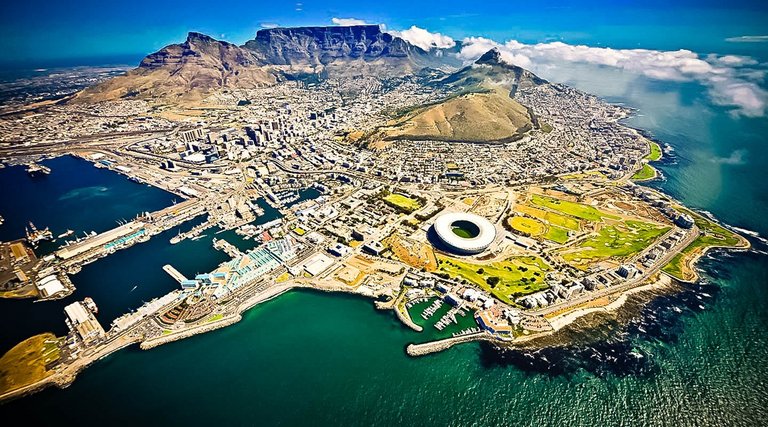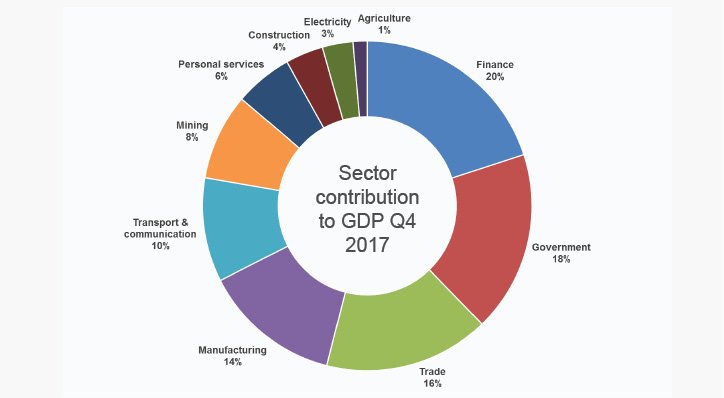To all manufacturer who are looking for new International opportunities to export to & import from. Ubinodes can help you to expand your market and grow in to many new regions you never dreamed of.
International Marketing Plan for South Africa.

Table of Contents.
- Overview.
- Trade Benefits of South Africa.
- South African Import opportunities.
- Export opportunities into South Africa.
- Regulatory environment.
- Cryptocurrencies in South Africa.
- Contact us.
- Sources.
1. Overview.
- South Africa is a country situated in the southern tip of the continent Africa. (It’s surprising how many people don’t know this.)
- It is almost twice (1.75 times) the size of Texas.
- It has a population of about 52 million people.
- South Africa’s currency is the Rand (R / ZAR).
- The Atlantic ocean is on the west coast while the Indian ocean is on the eastern coast and southern coasts. The two oceans meet at Cape Town.
South Africa's population consists of Zulu, Xhosa, Basotho, Bapedi, Venda, Tswana, Tsonga, Swazi, and Ndebele. In addition, many descents of Dutch, German, French, and British immigrants form part of the South African population as well. With further immigration coming from Asia, mostly Indian, Chinese and Malay, South Africa has developed a diverse population with roots in Indigenous Khoisan, Black, White, Malay and Indian ethnicities. As a result, South Africa has 11 official languages, Afrikaans, English, Ndebele, Northern Sotho, Southern Sotho, Swati, Tsonga, Tswana, Venda, Xhosa, and Zulu.
South Africa’s economy is the strongest in Africa and its GDP represents about 30% of the GDP of the entire continent.
The country has an abundant supply of natural resources and well-developed financial, legal, communications, energy, and transport sectors. South Africa also has a large agricultural industry which contributes around 10% of formal employment, though relatively low compared to other parts of Africa, this agricultural work provides for casual laborers and contributes around 2.6% of GDP for the nation.
South Africa’s currency, the Rand, is the world’s most actively traded emerging market currency, and from 2002 to 2005 it was the best performing currency against the US Dollar.

Great mineral wealth has underpinned the South African economy ever since the first diamond was stumbled upon in 1867. Gold was found soon afterward and that industry effectively saw to it that South Africa became an industrialized nation. Now those gold mines are tapering off production but iron ore and platinum reserves are impressively large.
The grains of the central regions of the country, together with the fruits and vegetables of Mpumalanga and Limpopo, the wines and grapes of the Western Cape and the sheep and mohair of the Eastern Cape, all contribute to a diverse and vibrant agricultural sector. There are many strong agricultural companies in the sector. KwaZulu-Natal is the country’s leading sugar area and has a strong suit in forestry and paper production.

South Africa is also a huge supporter of renewable energy as reflected in the current national agenda which signals a continued expansion of the already successful renewable energy sector. Beyond that being greener and cheaper, the renewable energy program has also attracted significant foreign direct investment (FDI) and provided new employment opportunities.
A quick snapshot of South Africa's Sector contribution to GDP is shown below to touch on the depth of market diversity.

Credit: STATS SA
2. Trade Benefits of South Africa.

- Increased profit margins.
- Lower prices for better value products– imports create new products, which in turn produces healthy competition on the African market and lower prices for consumers.
- More choice, better quality.
- Government support for developing trade relations and other infrastructure.
- Reduction of manufacturing costs.
- Promotes economic growth and expansion.
In addition, the southern Africa Development community signed a new economic partnership agreement with EU aimed at facilitating fairer trade between some region member states (Botswana, Lesotho, Mozambique, Namibia, South Africa, and Swaziland) and Europe. Rules and guidelines of origin were implemented allowing partial processing in more than one of the included Southern African Countries, which will importantly contribute to strengthening regional value chains.
South Africa is also the second largest producer of gold and is the world's largest producer of chrome, manganese, platinum, vanadium and vermiculite, the second largest producer of ilmenite, palladium, rutile, and zirconium. It is also the world's third largest coal exporter. Although, mining only accounts for 3% of the GDP, down from around 14% in the 1980s. South Africa also has a large agricultural sector and is a net exporter of farming products.
Principal international trading partners of South Africa—besides other African countries—include Germany, the United States, China, Japan, the United Kingdom, and Spain. Chief exports include corn, diamonds, fruits, gold, metals and minerals, sugar, and wool. Machinery and transportation equipment make up more than one-third of the value of the country’s imports. Other imports include chemicals, manufactured goods.
South Africa's main export trading partners are the European Union, the United States, and Japan. Recently China's share of South Africa exports has been increasing.
Almost 90% of South Africa's exports to the rest of Africa go to the SADC economies. In 2011, South Africa’s trade with the rest of Africa exceeded R220 billion (approx. USD30bn) which amounted to 17% of South Africa’s total trade globally. This amounted to a R40bn trade surplus for South Africa compared to a R68bn deficit with Asia. South African exports to the rest of Africa are predominantly of value-added goods.
3. South African Import opportunities.

Agricultural products
South African agriculture and agribusiness have a number of competitive advantages, making the country both an important trading partner and a viable investment destination. South Africa supplements local agricultural production with imports, key among these being consumer-oriented products, forestry products, and intermediate products.Aviation
Airports Company South Africa (Acsa) handles about 90% of the country’s aviation requirements, operating three international airports (OR Tambo International, Cape Town International, and King Shaka International) and seven national airports (Port Elizabeth, East London, George, Kimberly, Upington, Bloemfontein, and Pilanesberg airport near Sun City).
Since the massive upgrades for the World Cup in 2010, airport development has been ongoing, including freight handling upgrades. The domestic low-cost carrier market is active, and the air transport sector is growing.Equipment and machinery
South Africa’s most important import area, Equipment, and Machinery alone comprised 24% (R176.8-billion) of the nation’s total imports (R723.4-billion). This is the primary import not only from China but also from Europe, Japan, and India.
In 2013, the Automotive Production and Development Programme (APDP) was introduced in order to increase competitiveness and growth. Set to last until 2020, the ADP framework and provisions subsidize import duties, local assembly allowances, production incentives, and investment allowances.
Vehicles, aircraft, and transport equipment are also major import sectors.Information technology
South Africa’s information technology market is the largest in Africa, ranking 20th in the world in overall market size, and eighth in IT spending as a proportion of GDP, according to the Department of Trade and Industry.
South Africa has one of the Middle East and Africa’s most significant IT markets in terms of size and growth potential. Its IT market is supported by the government’s digital projects and the telecommunications sector.
As broadband access increases and internet penetration deepens, the demand for hard- and software increases as well.
A major opportunity lies in increased capital spending by small and medium-sized businesses, with a particular focus on environmental resources management and customer relationship management applications.Food and beverages
South Africa has always had a well-developed food and beverage industry, partly because of the country’s major agricultural activity, and partly because of its relatively sophisticated food requirements due to the massively diversified culture.
Importation of food preparations (such as sauces and condiments) has shown a steady increase over the past few years.Franchises
Key sectors for development include building, office and home services; automotive products and services; entertainment and leisure; hair, health and beauty; printing and photographic development; and restaurants.Green technologies
South Africa is beginning to implement measures to help reduce its reliance on coal to produce energy. The government’s moves towards increased efficiency and environmental protections, such as a focus on recycling, pollution control, green building technologies as well as renewable and alternative energies, present opportunities for companies experienced in these areas.International brands: fashion, giftware
South Africa has an expanding consumer base and a growing disposable income, and South African consumers are prepared to pay a higher premium for international brand products.Pharmaceuticals and chemicals
More than US$1-billion worth of pharmaceuticals are sold in South Africa annually, and the market is expected to grow substantially.
Opportunities exist in the supply of wound-management devices, advanced technology, and equipment, as well as specialist products.Railways
South Africa’s state-led capital-expansion programme includes the development of rail transportation – rolling stock, including trains and carriages – under the Transnet Expansion programme.
The R300-billion programme aims to move the transportation of minerals such as coal from roads to rail and will include upgrading of rail infrastructure as well as improvements to the country’s ports.
4. Export opportunities into South Africa.

South Africa primary exports commodities include gold, diamonds, platinum, other metals and minerals, machinery and equipment.
South Africa is the world’s 8th largest exporter of gold exporting around $21 billion worth of gold each year.
The case is similar for diamonds since South Africa is also the 8th largest exporter in this sector as well and having a very high comparative advantage for diamonds. South Africa exports around $7 billion in diamonds annually.
As for Platinum, South Africa is the number one exporter in the world, exporting around $10 billion worth of it each year.
South Africa is a big exporter of cars as well, ranking 19th globally, exporting $8 billion in cars per year.
Other lesser-known items of export are :
- Food & Beverage.
- Textiles & Apparel.
- Electronics.
- Home Goods.
- Personal and health care.
- Pet supplies.
Ubinodes recognizes and address' the wide range of barriers to exporting that manufacturers face such as not having a high proficiency in English, lacking international marketing skills, being uninterested in marketing and needing to focus on design and production, being unable to finance international staff or market research, not having overseas contacts, networks, or leads, and much more.
So, before a manufacturer enters a market they must assess its potential. We take that burden off of manufacturers by offering:
- Detailed and in-depth analysis of markets in every country where we have nodes.
- Design for websites, social media, digital print advertisements, and other communications media.
- Partnership and contract acquisition.
- A drive to provide anything required to make a project successful.
5. Regulatory environment.
South Africa is still experiencing and managing the political, social, economic and environmental heritage of the Apartheid era. Apartheid officially ended in 1994 and the new South African Constitution established the Republic of South Africa. The political, economic and social transformation of the country is fairly recent, having taken place in only the last 16 years. For this reason South Africa is often referred to as a young democracy, however, according to the UN, it remains categorized as a developing country.
Since the end of the Apartheid, South Africa has managed to implement sound economic and monitory policies, which have enabled constant and accelerating economic growth (fluctuating between 3 percent and 5 percent in the last five years). According to the economic indicators used by the Organisation for Economic Co-operation and Development (the OECD), these figures demonstrate major macroeconomic achievements in South Africa since 1994. The turnaround in budgetary performance has brought the public debt burden down to moderate levels. The government has been able to control the inflation rate, which has fluctuated between 3 percent and 7 percent (excluding the years 2009 and 2010). The economic policies have succeeded in establishing the confidence of foreign investors, which is critical for ensuring the sustainability of the current economic growth. South Africa has seen a remarkable increase in development and capital expenditure in the last years.
A huge and beneficial part of Ubinodes services is that there are a number of skilled nodes who will assist you in navigating through any and all regulatory requirement of trade within South Africa and many other countries around the world to give you ease of trade.
6. Cryptocurrencies in South Africa.

The cryptocurrency landscape in South Africa is at the moment largely unregulated. However, the South African Reserve Bank issued a whitepaper in 2014 outlining its position on what it called virtual currencies (VCs) and Decentralized Convertible Virtual Currencies (DCVCs).
The SARB does not have any objection to the use of DCVC’s (cryptocurrencies) – a clause in section 2.1 of the whitepaper authorizes that DCVCs can be used for the purposes of trading and in exchanges. For a cryptocurrency enthusiast, this means that we are free to trade and exchange bitcoin and other cryptocurrencies in South Africa.
Taxation laws and principles apply to all income under South African revenue regulations. According to an advisory comment from Luno, a reputable trading platform in South Africa, all Bitcoin (cryptocurrency) earnings are subject to taxation and therefore the public is advised to always consult a registered tax professional to ensure he/she remains tax compliant.
There are also a number of cryptocurrency exchanges that make it easy for anyone trade crypto, which can be linked to local banks for ease of accessibility and as such Ubinodes offers a safe and secure Token that can be used for transactions within the organization. This token can be used as a medium of exchange, as a store of value and can be used for payments of goods and services on the Ubinodes platform. For more information on our Ubinodes Token and Cryptocurrency as a store of value please see the following articles: https://steemit.com/dex/@ubinodes/how-to-buy-ubinodes-token and https://steemit.com/cryptocurrency/@ubinodes/the-ubinodes-token-as-a-store-of-value.
7. Contact us.
To successfully access the South African market and establish a presence there, you will need to assess the potential of its market and have an in-depth knowledge of South Africa's trade legislation/regulation, economy and opportunities. Here at Ubinodes we take on that burden and make all this knowledge available for you and more, offering services such as freight forwarding, customs clearance, regulations, packaging, storage, designing websites, brochures, developing marketing campaigns, advertising, finding points of sales, and whatever is required to make your project successful.
We do a detailed and in-depth analysis of the industry and how well your products will perform in that market. So if you are interested in exporting to or importing from South Africa look no further!! contact us at our Public chatroom: https://riot.im/app/#/room/#Ubinodes-World:matrix.org or send an e-mail to [email protected] and ask for a South African based consultant.
8. Sources.
Overview:
https://www.globalafricanetwork.com/2018/10/30/company-news/an-economic-overview-of-south-africa/
https://en.wikipedia.org/wiki/South_Africa
Benefits of South Africa:
https://en.wikipedia.org/wiki/Foreign_trade_of_South_Africa
https://www.waystocap.com/blog/what-are-the-advantages-of-africa-importing-goods-and-services/
South African Import oppotunities:
- See Health care in South Africa and South Africa’s chemical industry for more.
- National Association of Pharmaceutical Manufacturers: www.napm.co.za
- Pharmaceutical Industry Association of South Africa: www.piasa.co.za
- Chemical and Allied Industries’ Association: www.caia.co.za
- Chemissa – Value-added information on the chemical industry in South Africa: www.chemissa.co.za
South African Export oppotunities:
http://www.economywatch.com/world_economy/southafrica/export-import.html
https://www.quora.com/What-is-the-best-product-to-export-from-South-Africa
Regulatory environment:
Cryptocurrencies in South Africa:
https://www.golegal.co.za/cryptocurrency-regulation-south-africa/
https://en.m.wikipedia.org/wiki/Legality_of_bitcoin_by_country_or_territory
Congratulations @ubinodes! You have completed the following achievement on the Steem blockchain and have been rewarded with new badge(s) :
Click here to view your Board
If you no longer want to receive notifications, reply to this comment with the word
STOPDo not miss the last post from @steemitboard:
Vote for @Steemitboard as a witness and get one more award and increased upvotes!